In this guide, we have categorized the best and worst Toyota Avalon years from 2000 to 2022.
As a result, I’ll highlight the best Toyota Avalon generations to purchase and the worst Toyota Avalon generations to stay away from.
To provide prospective buyers an objective perspective on Avalon’s performance, reliability, and problems, I analyzed data, reviews, and first-hand accounts as derived from authoritative sources such as the National Highway Traffic Safety Administration, Consumer Reports, and Kelley Blue Book.
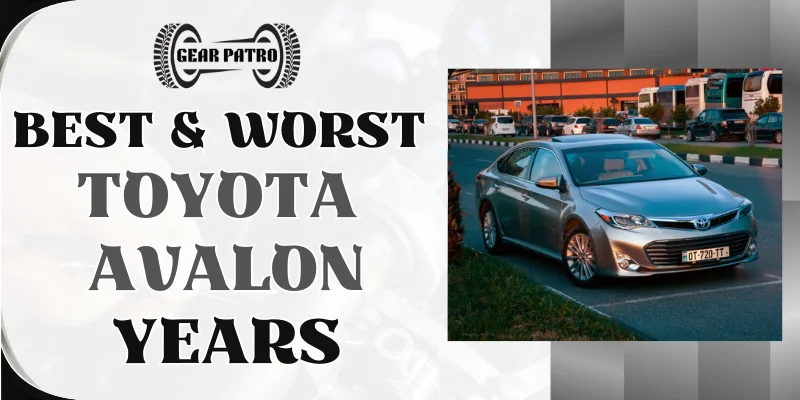
There is only one guide you need if you are looking for the most reliable Toyota Avalon years that are best for your budget and needs, as well as the most unreliable Toyota Avalon years that have the most problems listed by year.
Let’s jump right in.
Toyota Avalon Generations
In the mid-’90s, Toyota introduced its first generation of the Avalon into the automotive industry, which is widely acclaimed for its spacious interiors and sophisticated grace. We now turn our attention to the dawn of the new millennium, where the second generation is prominently positioned.
Featuring a powerful V6 engine, advanced safety features, and a refined design, the Avalon carved out a niche for itself in 2000.
From 2000 to 2022, we have compiled a generational table.
| Generation | Years |
| 2nd generation (XX20) | 2000-2004 |
| 3rd generation (XX30) | 2005-2012 |
| 4th generation (XX40) | 2013-2018 |
| 5th generation (XX50) | 2019-2022 |
As generations differ, it may be crucial to shape one’s preferences to consider the differences between generations when making a purchase decision.
Toyota Avalon Best, Neutral, and Worst Years
We consider an extensive range of critical sources and factors when ranking and categorizing Toyota Avalon years. The following factors are considered:
On the basis of extensive research, we’ve compiled a table that showcases all the best, neutral, and worst years for the Toyota Avalon.
| Generation | Best Years | Neutral Years | Worst Years |
| 2nd generation (XX20) | 2000 2001 2002 | N/A | 2003 2004 |
| 3rd generation (XX30) | 2011 2012 | 2009 2010 | 2005 2006 2007 2008 |
| 4th generation (XX40) | 2016 2017 2018 | N/A | 2013 2014 2015 |
| 5th generation (XX50) | 2020 | 2021 2022 | 2019 |
In Neutral Years, we refer to model years whose performance and reliability do not stand out as exceptional nor show significant issues. These models are middle-of-the-road options with balanced value.
The fact that some factors naturally contribute to negative outcomes is essential to understand. Our rankings are heavily affected by NHTSA recalls – the more recalls and complaints, the lower the perceived reliability and customer satisfaction.
Taking a closer look at the Toyota Avalon’s best, neutral, and worst years will reveal some interesting information.
Best & Worst Years for Toyota Avalon 2nd Generation (2000-2004)
Toyota’s Avalon aimed to position itself as a luxury and reliable flagship sedan in the US at the beginning of the new millennium.
The 2nd Generation Avalon was well received in the 2000s, 2000s, and 2002s, but later facelift models suffered from negative reviews and owner complaints in 2003 and 2004. Among all generations, this generation received a 4.8 rating from Kelley Blue Book (KBB) and Edmunds.
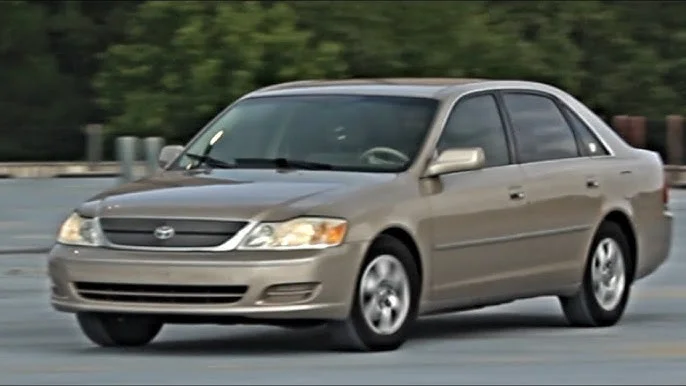
NOTE
One of the most common issues with the first-generation Avalon is a loss of power steering assist and engine sludge.
The Best Years: 2000, 2001, 2002
Among the second-generation Avalons, particularly the models produced in 2000, 2001, and 2002, are the best.
Toyota Sienna, Toyota Highlander, and Toyota Camry were powered by the same 3.0-liter 1MZ-FE V6 (210 hp) engine that was also used in the Toyota Camry. This engine offers fuel efficiency without compromising performance. In addition to delivering a smooth and responsive driving experience, it was also equipped with a refined 4-speed automatic transmission.
There were several different trim levels, from the base XL up to the luxurious XLS, all offering a variety of luxury, technological integrations, and safety features. Based on Consumer Reports’ calculations, the first generation features a city fuel efficiency of 13 mpg and a highway fuel efficiency of 31 mpg.
In addition to electroluminescent Optitron gauges, ABS with four wheels, front torso side airbags, and 15-inch alloy wheels, this vehicle is equipped with many standard features. Several options were available, including a JBL audio system, Vehicle Stability Control, and a bench seat in the front row, to accommodate up to six passengers. Additionally, power seats for the driver and passenger were optional, as were dual climate control and larger 16-inch wheels.
Although the past few years have been great years for Avalon, keep in mind these factors:
The Worst Years: 2003, 2004
It is recommended that Avalon owners avoid the facelifted second-generation models without a doubt. This is why:
In numerous reports, steering problems were highlighted, including problems with steering lock bars and power steering. Recalls were issued in response to potential crashes linked to such concerns.
As of 2010, it was announced that Toyota would be recalling all 2000-2004 Toyota Avalon models on account of improper casting of the steering lock bar. This can cause the steering wheel to lock up increasing the risk of a crash.
As far as airbags were concerned, the 2003 and 2004 Avalons also had considerable problems. There have been reports of inadvertent airbag deployments caused by electrical noise interference, as well as problems relating to sensors used to detect impact and occupants.
There has been a recall issued by Toyota regarding the crankshaft pulley for the 2004 Avalon because it may be defective, resulting in a detachment of the belt for the power steering pump, caused by loss of power steering.
Additionally, owners complained about vehicles accelerating without warning even in parking positions, highlighting unsettling incidents.
A significant concern emerged regarding engine sludge. It was important for owners to be vigilant about regular maintenance because of the thickening and buildup of oil, which could be disastrous to the engine.
The NHTSA has recalled and responded to complaints regarding the Toyota Avalon in 2000, 2001, 2002, 2003, and 2004.
Best & Worst Years for Toyota Avalon 3rd Generation (2005-2012)
Third-generation Avalon of Toyota sought to incorporate advanced technology, innovative design elements, and a powertrain that would meet evolving consumer expectations.
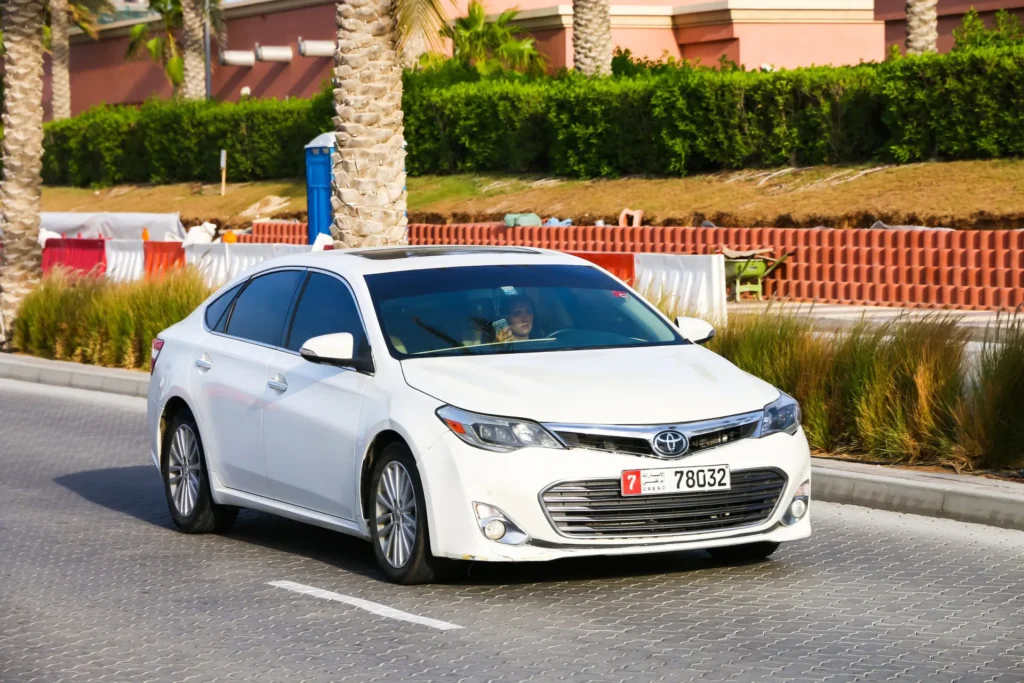
Among third-generation Avalon years, 2011 and 2012 rank highest, while 2005, 2006, 2007, and 2008 have the worst performance.
The Best Years: 2011, 2012
There is no doubt that 2011 and 2012 were the best years for the third-generation Toyota Avalon.
Toyota used a powerful 3.5-liter 2GR-FE V6 engine with 280 hp paired with a smooth 5-speed automatic transmission during these years. By blending power and efficiency, the Avalon was able to meet all of your needs. In city driving, the vehicle achieves 15 mpg and on the highway, it achieves 34 mpg.
There are only two trim lines in the facelifted 2011 Avalon: a base model and a more upscale Limited model.
As a result of Toyota’s innovative technology, including touchscreen navigation, advanced climate control, and enhanced JBL audio systems, its vehicles deliver a futuristic driving experience. The inclusion of safety features like rear-cross traffic alert and blind-spot monitoring is a key pillar of Toyota’s philosophy.
These years were also rated highly for reliability and owner satisfaction by consumer feedback platforms like Consumer Reports. Based on J.D Power ratings, third-generation Avalons scored 86 out of 100 on average, while Kelley Blue Book (KBB) and Edmunds scored 4.7 and 4.6 out of 5.
The Neutral Years: 2009, 2010
Even though they had some baggage from their predecessors, 2009 and 2010 navigated to the neutral terrain effectively.
Despite sharing a robust 3.5-liter V6 engine and many technological advancements with succeeding years, these models had their fair share of problems. In spite of the reduction in the number of problems, there were still some remnants from earlier models.
You may be interested in researching earlier years’ problems, although there are fewer NHTSA complaints now that there were in the past.
The Worst Years: 2005, 2006, 2007, 2008
What year does Avalon have a bad record? Especially from 2005 to 2008, the first years of the 3rd Generation should be avoided. The reasons are listed below.
Owners complained about unpredictable accelerations that resulted in distressing incidents when it came to vehicle speed control. As a result of the recall in 2010, certain 2005-2010 Avalon models may experience intermittent acceleration and crash risks associated with a hard-to-depress accelerator pedal or a prolonged return to idle.
Additionally, steering column locking levers failed, causing steering columns to collapse even during active driving, as evidenced by loud clicking noises.
Furthermore, the 2006 Avalon was reported to have oil leaks that emanated from rubber-made VVT-i oil lines, timing covers, and oil hoses. In the 2007 and 2008 Avalon models, these issues persisted and even escalated.
This model cannot be discussed without addressing the widely reported “Toyota Avalon headlight issues”, in which the headlights would operate intermittently, placing the safety of nighttime drivers at risk.
The NHTSA has recalled and received complaints about the Toyota Avalon in the years 2005, 2006, 2007, and 2008.
Best & Worst Years for Toyota Avalon 4th Generation (2013-2018)
In the automobile industry, Toyota’s 4th Generation Avalon stands out as a superb example of the company’s commitment to bridging luxury and performance.
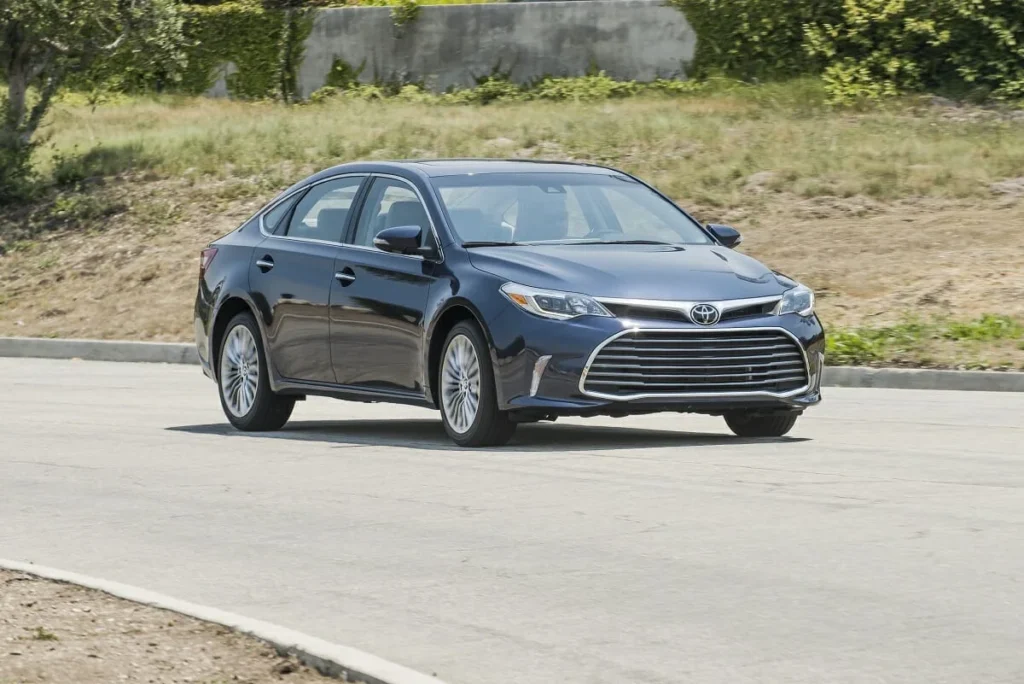
In comparison with previous generations, Avalons from this generation are most reliable from 2016 to 2018. It is best to avoid the Avalon models from 2013, 2014, and 2015.
The Best Years: 2016, 2017, 2018
Which years are best for used Toyota Avalons? The best years to buy a secondhand Toyota Avalon are 2016, 2017, and 2018. The Toyota brand improved its overall driving experience during these years, by meticulously addressing concerns from earlier models.
A robust 3.5-liter V6 engine and 6-speed automatic transmission powered the Avalon, ensuring both efficiency and performance were delivered. There is a 2.5 L inline-4 engine powering the Avalon Hybrid, which produces 200 hp in total.
The Avalon hybrid engine returned 40 mpg for city driving and 39 mpg for highway driving, while the gasoline engine returned 16 mpg for city driving and 34 mpg for highway driving.
Adaptive cruise control and automatic high beams are among the most advanced safety features installed in today’s cars. Touchscreen infotainment systems with enhanced connectivity options, advanced driver assistance systems, and self-parking are also standard.
Several updates were made to the 2016 Avalon, such as an improved suspension for improved ride comfort, redesigned wheels, and the standard Toyota Safety Sense P system.
The Worst Years: 2013, 2014, 2015
You should avoid 2013, 2014, and 2015 Avalons due to significant interior, VSC, and brake issues.
In 2013, owners complained about unintended accelerations, unexpected stalls, and other issues associated with vehicle speed control in the 2013 Avalon.
It was not uncommon for airbag systems to experience glitches. There have been numerous reports of airbag failures during incidents, and water leaks from the sunroof have compounded the problem.
Neither 2014 nor 2015 saw much improvement for the Avalons. They inherited some issues from 2013, but introduced new ones, including braking concerns.
The braking distances of some Avalons have increased or, worse still, the brakes have been activated unintentionally by some owners. As part of the recalls from this period, the Pre-Collision System (PCS) was cited as being at fault for sudden and unexpected brake activations resulting from misreading certain road conditions.
NHTSA recalls and complaints for the Toyota Avalon for 2013, 2014, and 2015.
Best, Neutral & Worst Years for Toyota Avalon 5th Generation (2019-2022)
As of 2019, the 5th generation Toyota Avalon stood out for its combination of technology, luxury, and design, as well as its fuel efficiency and technological advancements.
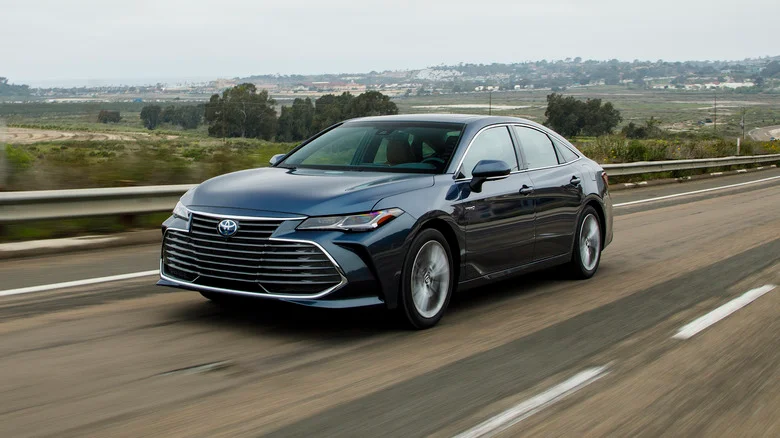
However, this generation also received some criticism with a KBB of 3.9. When compared to the later and most reliable 2020, 2021 and 2022 models, the 2019 Avalon is clearly inferior.
The Best Years: 2020
As far as this generation of Avalons goes, the 2020 Avalon has emerged as the best. Taking into account feedback from the previous year, Toyota made a concerted effort to improve the car.
Drivers will enjoy an unmatched balance between raw power and seamless transitions thanks to the 3.5-liter V6 engine (301 hp) hidden beneath the car’s sleek styling.
In addition to a 2.5 L 207 hp inline-four, it came with a hybrid powertrain consisting of a 2.5 L 176 hp I4 and a 118 hp electric motor.
As reported by Consumer Reports, the car achieves impressive fuel efficiency ratings of 32 mpg in the city and 52 mpg on the highway.
This model of modernity featured an outstanding technology suite. The vehicle is equipped with a high-quality infotainment system with smartphone integration, as well as premium audio setups that provide a comfortable and safe driving experience.
In addition to these features, it also boasted commendable safety features, making it this generation’s most reliable Avalon.
The Neutral Years: 2021, 2022
There was steady performance from Avalons in 2021 and 2022. It incorporated enhanced lane-keeping assist, pedestrian detection, and adaptive cruise control to continue the trend of incorporating advanced technology.
Performance enthusiasts and eco-conscious consumers benefited from both versions of the 3.5-liter V6 that offered variations and a hybrid option.
It wasn’t necessarily that the 2021 and 2022 Toyota Avalons brought groundbreaking changes or improvements, but they were reliable and solid performers. As a result, they have a neutral standing because of their consistency in performance and feature set.
The Worst Years: 2019
Avalon’s 2019 is the most advanced year in the 5th generation, so it’s better not to consider 2020 or even 2018 from the 4th generation if you’re looking for a more durable one.
The power train and engine were particularly notorious this year. There were complaints from owners that the transmission jerked and slipped, particularly at low speeds, resulting in a bad driving experience.
In addition, a recall issued in 2020 addressing fuel pump failures caused the engine to stall, creating a significant safety risk.
It was a proud launch, filled with innovative features and a modern design, but these challenges marred the launch of the 2019 Avalon. It is important to note that this recall also targets the 2020 Avalon.
In order to enjoy a more refined driving experience, Toyota enthusiasts and potential buyers were advised to consider later models of the same generation.
The NHTSA has recalled and criticized the 2019 Toyota Avalon.
Best & Worst Toyota Camry Years | Years To Avoid
Best & Worst Toyota RAV4 Years (Years To Avoid)
Best & Worst Toyota Highlander Years | Years To Avoid
Best & Worst Toyota Tacoma Years | Years To Avoid
Best & Worst Toyota Tundra Years | Years To Avoid
Best & Worst Toyota Prius Years | Years To Avoid
Conclusion
With this information, you now have a better understanding of the reliability and performance of the best Toyota Avalon years. As far as Toyota Avalons go, I recommend the 2016-2018 models or older best-year models if you do not have age restrictions.
What model year of Toyota Avalon do you consider the most reliable based on our breakdown?
Post your comments below and let us know what you think.
